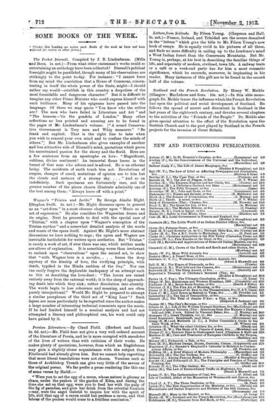Persian Literature. — By Claud Field. (Herbert and Daniel. 3s. 6d. net.)—Mr.
Field does not giVe a very well ordered account of the literature of Persia, and he is more occupied with anecdotes of the lives of writers than with criticism of their works. He makes plenty of quotations, however, from-which an Englishman may gain a slightly closer acquaintance with the subject than FitzGerald had already given him. But we cannot help regretting that more literal translations were not chosen. Versions such as those of Archbishop Trench can give very little of the savour of the original poems. We far prefer a prose rendering like this one of some verses by Hatifi " Were you to set the egg of a raven, whose nature is gloomy as chaos, under the peahen of the garden of Eden, and during the time she sat on that egg, were you to feed her with the pulp of the fig of paradise, and give her drink from the .celestial fountain —nay, were the angel Gabriel to inspire her 'with the spirit of life, still that egg of a raven could but produce a raven; and that labour of the peahen would come to a fruitless conclusion." • -.- • Leiters/ram Solitude. By Filson-Young. (Chapman and Hall'. net)—France, Ireland, and Trinidad. are the scenes :described - in- the "letters " which give the title to Mr. Filson Yeung's new, book of essays. He is equally vivid in his pictures of all three, and finds no more diffieulty in calling up' to the Londoners mind a West Indian forest than the Connemara MouitaiNs. Bet. Mr. Young is, perhaps, at his best in deseribing the familiar thing,s of life, and especially of modern; civilized, town life. 'A railway train or a cafe or a week-end party has for hull a most romantic significance,- which he suceeedri, moreover,: in implanting in his reader. Many instances of this gift are to be found in the second half of the volume.


























































 Previous page
Previous page